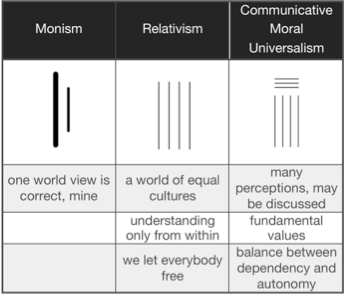Sign up for FlowVella
Sign up with FacebookAlready have an account? Sign in now
By registering you are agreeing to our
Terms of Service
Loading Flow

Concepts of Culture
From the perspective of multicultural society the three starting points of cultural anthropology for perceiving culture are particularly useful. As mentioned by Van Asperen: monism, relativism and communicative moral universalism.
Monism
Monism is the idea that ‘my culture is more beautiful and better than any other culture and the other culture is inferior to mine’. It is a feeling of superiority of one culture over another. You find it in the attitude of some politicians in the West regarding Islam. You also find it in marketing, e.g. a company that declares to make a superior product.
Relativism
The second basic concept is relativism. It is the view that all cultures are equal, but also so specific that you never can really understand another culture. You cannot simply be raised again. This also means that bridging cultures is not useful, you can only respect another culture as such, just as other cultures should accept your culture as it is.
Ultimately, you will get a society that exists of small islands of different cultures; together but separate. These islands don’t form a community with each other, because no common framework exists. Within a multicultural society you may see neighbourhoods for ethnic groups and people from other groups do not belong there. In such circumstances it is quit difficult to form a (national) unity.
Communicative Moral Universalism
In the third concept, communicative moral universalism, you acknowledge that cultures have some elements in common. These common elements may be used to build bridges between cultures. Several cultural anthropologists refer to the Universal Declaration of Human Rights as an example but the interpretation of these rights differs considerably, leave alone the question whether the treaty only applies to the state or to individual citizens as well. Leaving this example aside you see that universalism starts the dialogue in order to find commonalities.
